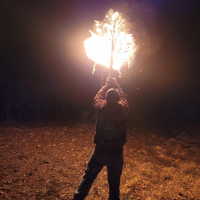- Posts: 5242
The End of Casual Christianity
Part of the message is hidden for the guests. Please log in or register to see it.
the advance, particularly among the young, of an appealing, powerful culture that has its own standards and values (expressive individualism, moral relativism, lifestyle liberalism) but no longer presupposes religious belief and finds traditionalism to be repressive
That sounds a bit like Jediism

Do Christians and former Christians think this is the direction of future of religious belief?
Please Log in to join the conversation.
It won't let me have a blank signature ...
Please Log in to join the conversation.
Convictions are more dangerous foes of truth than lies.
Please Log in to join the conversation.
Akkarin wrote: The End of Casual Christianity
Part of the message is hidden for the guests. Please log in or register to see it.
the advance, particularly among the young, of an appealing, powerful culture that has its own standards and values (expressive individualism, moral relativism, lifestyle liberalism) but no longer presupposes religious belief and finds traditionalism to be repressive
That sounds a bit like Jediism
Do Christians and former Christians think this is the direction of future of religious belief?
They should beliefe what they beliefe I guess, honestly I think that the direction of the Christian faith is like a sollid road that want to walk the same path for over hundereds of years. When they find out that the road is changed they try to build a new road as good as they can. Maybe all faith share this curiosity anyway.. :huh:
Please Log in to join the conversation.
Christianity has changed many times over its long history. The issues of importance of one age or place give way to different concerns in another time and place. Also, Christianity is not one thing and never has been. It is a diverse constellation of beliefs where groups are distinguished by which tenets, interpretations, and theologies they adhere to. Even within a Congregation (which could be local, national or international ) individual Christians may share some beliefs but not others.
Please Log in to join the conversation.
- Carlos.Martinez3
-

- Offline
- Master
-

Registered
- Posts: 7880
Pastor of Temple of the Jedi Order
pastor@templeofthejediorder.org
Build, not tear down.
Nosce te ipsum / Cerca trova
Please Log in to join the conversation.
Alan wrote: C & E aka 'Chreasters' are terms that refer to those Christians who attend church only on Christmas and Easter.
Christianity has changed many times over its long history. The issues of importance of one age or place give way to different concerns in another time and place. Also, Christianity is not one thing and never has been. It is a diverse constellation of beliefs where groups are distinguished by which tenets, interpretations, and theologies they adhere to. Even within a Congregation (which could be local, national or international ) individual Christians may share some beliefs but not others.
Dear Alan, still wondering why they have a love for building Churches, started as houses until the middle ages with enormous cathedrals and later on 'modern' types of church buildings, all to come closer to their believe.. Sounds quite like 'almost always' in Christian history.
Even other faiths used holy buildings or declared locations as holy.. Can it be that Christianity has developed and changed many times in history, but still keeping some core guidelines in their evolution? One road does not mean that there are multiple travelers on it. :blush:
Please Log in to join the conversation.
May faiths build a place for their sacred and what that sacred is will determine the dwelling's purpose.
A gathering place.
A temple to house the deity.
An expression of beliefs held.
Some buildings are mirrors of the cosmos, like Hindu and Buddhist temples or American Plains Indian teepees.
Some religions have no building, like the ancient Zoroastrians, but only a fire altar upon the hilltop.
Christian sacred space is within church walls and is of a different theological quality than the profane world outside.
The Muslim's prayer rug is a representation of the Garden of Eden where, like Paradise itself, puts the believer in direct contact through prayer with Allah the Merciful.
Some sacred places have buildings erected there and the myth of that place is represented in the temple, as in Shinto.
Theology informs architecture.
Please Log in to join the conversation.
